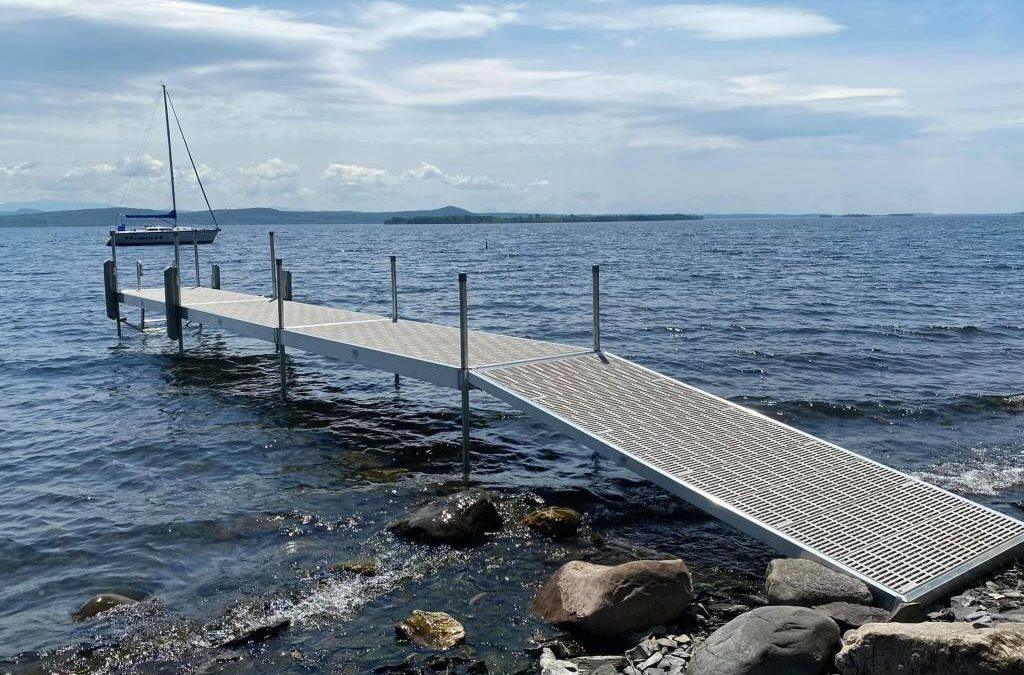Building a dock can be a daunting process, from the planning, to procurement, to building. However, we have compiled a list of seven items to think about before you start building a dock, and the more that you contemplate the ideas below, the more successful your dock building, and eventual dock enjoyment will be.
- What do I want my dock to do?
When building a dock, it is essential to know beforehand what you want it to do. Do you want a party pad over the water? Or maybe an area to enter and exit your boat? What you wish your dock to do or what you want to do with your dock changes how you plan, research, decide on and build your overwater investment.
- What are my shore and bed conditions?
The conditions of the area that you decide to build your dock within are also particularly important and can completely change the way you make your dock. It can dictate what type of dock you use, what foundation is necessary, if it can be built on your own, or if it needs to be constructed professionally. Typically, the easiest is a soft, sandy bed; however, docks can be built on other water beds, just requiring more labor and effort.
- What materials do I want to deck with?
The material you choose to deck your dock with is also a crucial choice. Decking can completely change how your deck looks, performs, and even how safe it is. Pressure-treated lumber is one option on the cheaper side, but it heats up too much and is too slippery and unsafe for many people to use on their dock. Another option is any of the SunWalk™ Superior Surfaces, being slip-resistant, strong, durable, and always stays cool.
- What are my construction and DIY Levels?
Assessing one’s abilities is also a critical step before taking on such a large job as building a dock. If you have a heavy background in carpentry, welding, construction, or just good DIY skills, building your dock may be an option, depending on the materials it is to be made of and where the dock is to be located. However, if your DIY skills are not up to par for such a project or the dock’s conditions are challenging to build around, then a professional may need to be hired.
- What type of dock do I need?
Asking yourself what kind of deck you need is also an excellent question to ask yourself before thinking about building. Does the dock need to be removable in the off-season? Then you may need a floating or roll-in dock. Do you need a permanent dock? Then a crib dock may be what you need. Or maybe with water floor erosion, you want a more permanent dock that is slightly adjustable, then a pipe dock may be in order. Knowing what type of dock you need is critical to understand when first starting to build, and building the wrong type can cause you problems and cost you more money in the future.
- How much work do I want to put into maintenance?
Maintenance is an essential part of the dock upkeep process, typically happening every season, if not multiple times. While pressure-treated lumber or other materials may be cheaper to buy at the start, the amount of maintenance they require takes more money out of your pocket and quality time out of your cottage experience over the long run. Materials like SunWalk Superior Surfaces require little maintenance and no resurfacing, chemical treating, or staining, meaning that you will have to spend less time maintaining your dock throughout its life.
- What rules and regulations do I have to comply with?
When building a dock, not only do you have to go through a lengthy permitting process but in some locations, some other rules and regulations must be complied with. One example of such is in parts of Florida. The Army Corps Of Engineers requires that a dock has a minimum of 43% light pass through to prevent the destruction of the natural water habitat underneath. With such regulations, some materials do not make the cut. When you know what rules you have to comply with, you can design your deck around them, such as using SunWalk 45 series or 90 series panels, which both meet or exceed the 43% light passthrough requirement.

We are thinking of getting a Sunwalk deck but would like to know in cold, cold condition how good is it. We have our cottage in Mulgrave and Derry Municipality in the province of Quebec. The winter are cold at times so was wondering how the sunwalk will stand the cold weather?
Thank you for contacting us. We will have someone reach out to you soon.